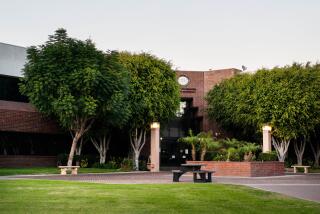Passing the 100-Year Checkup
IRVINE — Until the night she sneaked out of her Monrovia home 70 years ago, Dorothy Marsh always wanted to be a veterinarian.
On that night, the youngster slipped out the backdoor, ran up the street and climbed an orange tree that gave her a clear view into the bedroom of a woman in labor.
“I watched that gal have her baby, and I forgot about messing with animals right there,” said Marsh, a 1938 graduate and former clinical director of obstetrics of the medical school that later became UC Irvine’s College of Medicine. “It was a miracle.”
Marsh, 80, who funds the Dorothy Marsh Endowed Chair in Reproductive Biology at UCI and delivered more than 8,000 babies in 46 years of practice, is one of hundreds of physicians returning to celebrate the centennial anniversary of Orange County’s only medical school.
After a year of negative publicity brought on by layoffs and a scandal at the university’s world-famous fertility clinic, graduates this week were eager to commemorate the college’s own birth on June 1, 1896. Hundreds attended gala dinners, seminars and a dedication of a remodeled teaching clinic and student service center on campus.
“I’m only nine years younger than the celebration,” joked Dr. Forest J. Grunigen, a 1931 graduate and a retired urologist who now lives in Newport Beach. “But we really helped improve the health care for the people of California. I’m proud to have gone there.”
A century ago, the school, then called the Pacific Sanitarium and School of Osteopathy, hardly had the look of an institution that would someday rank 16th among the nation’s medical schools, according to the latest survey by U.S. News World and Report, whose favorable ratings are highly prized by colleges and universities. In its first year, the school enrolled just a dozen students in an Anaheim hotel equipped with little more than microscopes, Bunsen burners and running water and gas.
After more than half a dozen name changes and moves, including to Los Angeles and Pasadena, the College of Medicine eventually landed at UCI three decades ago and quickly grew into a 28-acre medical teaching, research and patient care center. Recognized nationally for its neuroscience and cancer research programs, the school today boasts 368 students and a 600-member faculty, receives an estimated $62 million in research grants and treats some 250,000 patients at its five clinics each year.
“The school has come a long way, even in the last 25 years,” said Dean Thomas C. Cesario, who notes the school receives 5,000 student applications annually for 92 openings. “One of the great tributes of this school is that it’s never been handed anything on a silver platter. We’ve had to struggle for most everything we’ve gotten.”
Indeed, the school in its many past and present incarnations has faced its share of challenge and controversy. Because of its original emphasis on osteopathy, the school suffered from a mild inferiority complex. (Osteopathy stresses healing through the manipulation of body parts, while using some standard medical practices such as surgery or drugs.)
“We were considered cultists by organized medicine,” said Grunigen, who graduated from the school in 1931 when it was called the College of Osteopathic Physicians and Surgeons in Los Angeles. “We weren’t allowed to participate in the medical corps or the armed forces. We were pretty low on the totem pole.”
But Grunigen helped lead a movement in the early 1960s to merge osteopathic practices with traditional medicine. The new approach was more acceptable to the UC system, which allowed the school to relocate to the Irvine campus in 1967.
Controversy returned last year when the school was rocked by an internationally publicized scandal at UC Irvine’s now defunct fertility clinic. Three doctors--all of whom were on staff at the medical school--are accused of stealing human eggs and embryos and implanting them in others without consent. They have denied any intentional wrongdoing.
While tarnishing the school’s image, the scandal also meant that medical students, who formerly studied reproductive medicine with world-renowned doctors, instead learned under part-time and contract instructors.
And last month, citing financial pressures, the school closed a 25-year-old Laguna Beach clinic and terminated its 23 workers. That cost-cutting move followed the school’s decision to lay off 151 health-care workers in March.
Critics charged the actions were part of the UC Board of Regents’ effort to more tightly control the future of medical care in its clinics and hospitals statewide and move them closer to privatization.
School officials, however, explained the cutbacks were necessary to cope with the predominance of managed health-care systems. The systems have shortened the average hospital stay of patients, and that, in turn, has reduced staffing needs, school officials say.
But the College of Medicine is hoping to move past its recent troubles and expand its program, which already ranks as one of the country’s largest for residency in primary care and internal medicine.
“This school has a wonderful tradition, it has survived many struggles including the fertility struggle,” Cesario said. “At 100 years, we are still growing and looking toward the future. It’s a bright sign for the school, the university and the community.”






